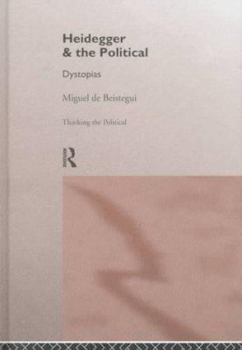Heidegger and the Political
Select Format
Select Condition 
Book Overview
Opening with a sensitive discussion of the controversy of the Heidegger 'affair', Miguel de Beistegui examines key themes in Heidegger's philosophy, linking this throughout with the more political public Heidegger.
Format:Paperback
Language:English
ISBN:0415130646
ISBN13:9780415130646
Release Date:November 1997
Publisher:Routledge
Length:216 Pages
Weight:0.85 lbs.
Dimensions:0.7" x 6.2" x 9.2"
Customer Reviews
1 rating
Heideggger's Nazism revisited
Published by Thriftbooks.com User , 24 years ago
There is a veritable cottage industry of writings on Heidegger's Nazism, Julian Young's book "Heidegger, philosophy, Nazim" being the most well-known apologist for Heidegger. Recent books such as this one and the excellent "Historical Destiny and National Socialism in Heidegger's 'Being and Time'" by Johannes Fritsche (another 5-star book) would surely need to add something to the already over-worked debate, and indeed they do. They go beyond political introspection and historical incidents such as Heidegger's physical signing on the dotted line of Nazi party membership to the texts themselves. To take some brief examples, Beistegui points to the exact texts in Being & Time where the concept of history is politically oriented and history identified with destiny. Moreover, Heidegger's Nazism did not come to and end with his active involvement in party politics and his so-called turn to aesthetics, albeit that he criticized actual Nazi party ideologies - art as the event of the disclosure of truth. For instance, Heidegger's view of the 'polis' is still mythological. Also if art itself for Heidegger is 'merely' the disclosure of being, and thus epi-phenomenal, the same most certainly goes for ethics and historical events such as the holocaust, which was 'merely' another event from the perspective of being (see especially pages 151-157).





